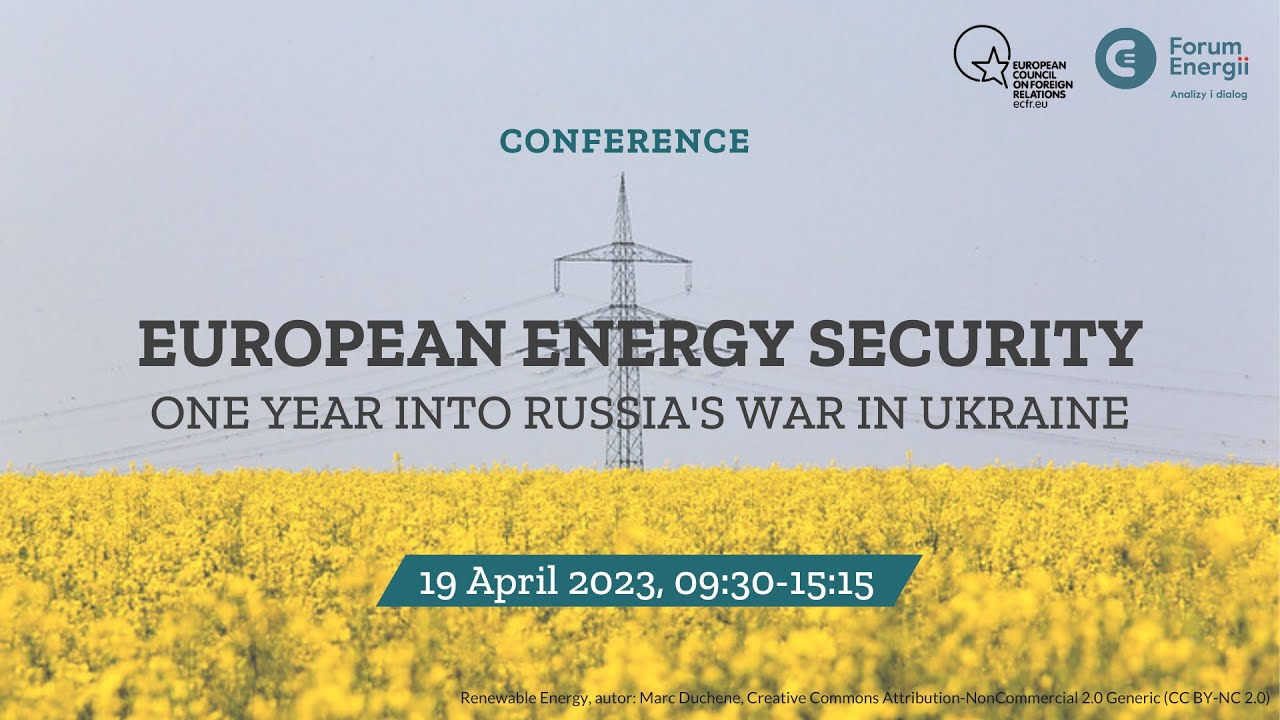European energy security: One year into Russia’s war in Ukraine
The ECFR Warsaw Office and Forum Energii invite you to attend the conference “European energy security” to reflect on how the events of recent months are affecting energy security in Europe and what the priorities should be in the coming period
Hybrid event
In its aggression against Ukraine, Russia used Europe’s dependence on its fuels as an element of pressure. The European Union reacted in solidarity and decided on a radical step – economic sanctions and cutting off supplies from Russia.
The next few months will significantly impact the approach to energy security. The relationship between the European Union and the United States is essential to break the dependence on Russia. Traditionally, energy security meant secure fossil fuel supply chains. Now, this definition should change. Renewables and energy efficiency will play an increasingly important role. An energy system based on variable energy sources has many advantages, but it needs to be much more flexible to operate safely and reliably. It is also pushing us toward dependence on rare earth metals imports. What should be the new definition of energy security? How is the energy transition changing our approach to it?
The war in Ukraine has another energy dimension affecting the energy security of the EU’s Eastern neighbourhood. Russia has decided to destroy the energy infrastructure in Ukraine to make it more difficult to rebuild the country after the war. Russia exploited Moldova’s dependence on Russian gas and electricity supplies to deepen the country’s energy crisis by exerting political pressure on Chisinau. For the world, which has already come out in support of Ukraine, this means a more significant commitment to restoring heat and electricity supplies. What should the reconstruction of Ukraine look like? What needs do Ukraine and Moldova have? What are the priorities? How to make the energy infrastructure in Ukraine and Moldova more resilient? We will be answering all these questions and more during our conference.
Objectives of the event:
- Diagnose energy security deficits in Europe;
- Draw lessons from the crisis for enhancing Europe’s energy resilience;
- Prepare for the next winter
- While diversifying from Russian fuels, how to avoid other dependencies?
- Exchange opinions on the directions, ways, and tools for rebuilding Ukraine’s energy sector after the war and improving the energy security of the EU’s Eastern neighbours.
If you would like to attend the conference on-site, please email [email protected] or [email protected]
ECFR’s co-organization of the Conference is made possible through the support of Orange Polska

Agenda
09:30 – 09:45 | Opening and welcoming remarks
- Piotr Buras, Head, European Council on Foreign Relations Warsaw
- Dr. Joanna Maćkowiak-Pandera, CEO, Forum Energii
09:45 – 10:50 | Part 1: Is the EU energy and climate policy in Poland’s interest?
- Paweł Musiałek, President of the Jagiellonian Club
- Adam Traczyk, Director, More in Common Poland, Warsaw
Moderated by: Piotr Buras, Head, ECFR Warsaw & Dr. Joanna Maćkowiak-Pandera, CEO, Forum Energii
10:50 – 12:00 | Part 2 – Responding to the energy and climate crisis – how to become more resilient?
Video keynote: Kadri Simson, Commissioner for Energy, European Commission
- Mats Engström, Senior Policy Fellow, European Council on Foreign Relations
- Dr. Georg Zachmann, Senior Fellow, Bruegel
- Diana-Paula Gherasim, Research Fellow, Center for Energy & Climate, French Institute of International Relations (IFRI)
- Monika Morawiecka, Senior Advisor, Regulatory Assistance Project
Moderated by: Jakub Wiech, Editor-in-Chief, Energetyka24.com
12:00 – 13:00 | Lunch break
13:00 – 14:00 | Part 3 – Partnership, cooperation and integration: Shaping the EU-Ukraine energy relationship
Video keynote: Yaroslav Demchenkov, Deputy Minister of Energy, Ukraine
- Dr. Oleksandr Antonenko, Senior Energy Efficiency, Climate and Renewable Energy Official & Ukraine Task Force Leader, Energy Charter
- Adam Cwetsch, Head, European Green Deal Unit, Energy Community Secretariat
- Roman Nitsovych, Research Director, DiXi Group
- Kateryna Polyakova, Director, European-Ukrainian Energy Agency
Moderated by: Maciej Zaniewicz, Senior Analyst, Forum Energii
14:00 – 15:00 | Part 4 – The future of energy security in Europe: How to avoid new asymmetric dependencies
- Dr. Szymon Kardaś, Senior Policy Fellow, European Council on Foreign Relations
- Dr. Susanne Nies, Project Lead, Helmholtz Center Berlin
- Velina Tchakarova, FACE for A Conscious Experience, former Director Austrian, Austrian Institute for European and Security Policy
- Frauke Thies, Executive Director, Agora Energiewende
Moderated by: Zuzanna Nowak, Senior Energy and Climate Analyst, Polish Institute of International Affairs
15:00 – 15:05 | Summary of the conference

